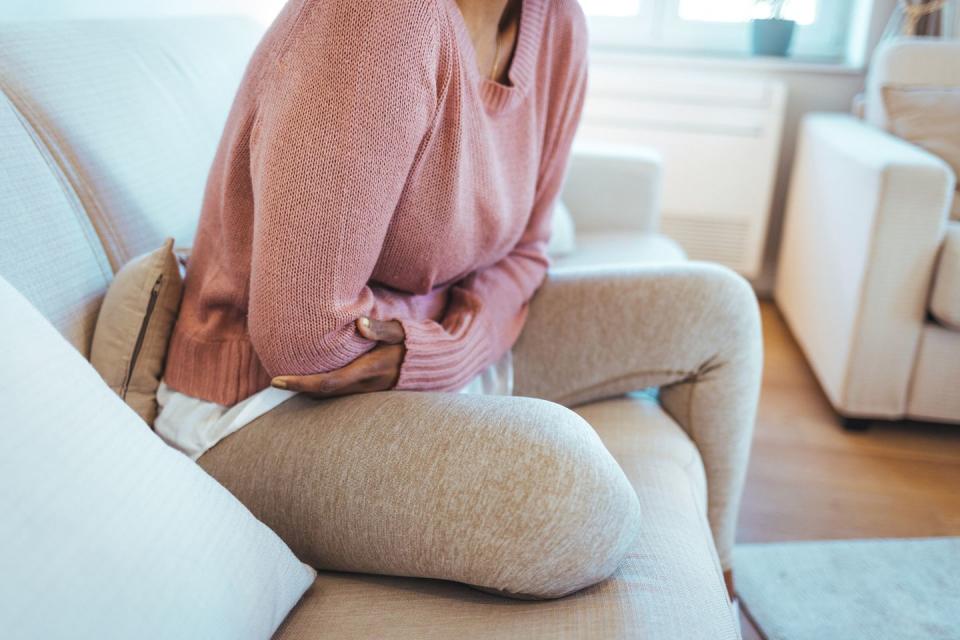IBS symptoms in women that you may not know about

Irritable Bowel Syndrome (IBS) is a common condition, thought to affect one in five adults in the UK. However, symptoms vary widely and go up and down over time, so it can be difficult to get a diagnosis.
Thanks to this lack of universal symptoms, and no clear test that can be taken to define it, people can go untreated for years.
"Irritable Bowel Syndrome, known as IBS, describes a collection of digestive symptoms and affects more women than men," explains nutritionist, Rohini Bajekal. "Concerning symptoms, women more often complain of abdominal pain and constipation-related symptoms, while men more commonly report diarrhoea-related symptoms."
Despite being incredibly common, Bajekal explains that IBS can still impact our day to day life. "Studies have shown that women with IBS were found to be more likely to avoid certain foods, jobs, domestic activities or sexual intercourse. In addition, women IBS patients showed less decision-making authority in planning their work schedule, fewer opportunities to learn at work, and required more long-term sick leave than those without the condition."

Common symptoms of IBS in women
Abdominal pain and cramping
Constipation
Diarrhoea
Flatulence
Urge to go to the loo, especially at night
Low energy
However, some symptoms are less common but can also be a sign of IBS.
Lesser known IBS symptoms in women
1) Sexual dysfunction including painful sex
Gone off sex? It could be IBS. Bajekal explains that "IBS has a known impact on sexual dysfunction, ranging from a decreased sexual drive to painful intercourse. Women who suffer from IBS have more difficulty relaxing and enjoying sex and are more likely to avoid sex than men."
If you’re struggling with sex due to IBS, Bajekal suggests skipping deep penetrative sex, and instead "exploring different positions, non-penetrative forms of sexual activity and other ways to be intimate, as well as psychosexual counselling."
2) Backache
Despite the fact that IBS is primarily a gut issue, the body works in mysterious ways and some women with IBS experience backache. If you experience recurring back pain with IBS, it may well be connected, but it may have another cause, so you should make an appointment with your GP.
However, there’s also something called "referred pain", which is when we feel pain somewhere else in the body than where it originates.
Many women with IBS report lower back pain, especially at night, which can lead to difficulties with sleep. Medications that relieve constipation and gas can help relieve IBS-related back pain, along with deep breathing and regular exercise.
3) Nausea
Nausea can also be a symptom of IBS for many women; indigestion is a woman with IBS’s regular companion. In one study by UCLA, 4 in 10 women with IBS reported nausea. There’s usually a secondary cause, such as GERD (gastro-oesophageal reflux disease), but this often goes hand in hand with IBS. So, if you’re feeling bloated, queasy or experiencing pain in the upper abdomen - it could be your IBS.
4) Changes to your period

It might surprise you, but the menstrual cycle and our digestive system are connected – many people with periods suffer from 'period poop', where their bathroom habits change in the phase before their period. And, it can affect those with IBS as well.
Bajekal notes, "Many women with IBS find that their symptoms worsen before or during their period. Worsened GI symptoms, such as abdominal pain, bloating or diarrhoea are observed in patients with IBS. This may be due to elevated prostaglandin levels during menses, with an enhanced perception of viscera-somatic stimuli resulting in nausea, abdominal distension and pain."
Bakejal says that there are things we can do that will help: "Eating a healthy diet that is low in ultra-processed foods, moving your body, keeping a symptom diary and using pain relief such as a hot water bottle can help."
5) Fibromyalgia or other pre-existing conditions
Bajekal explains that certain things will make you more predisposed to IBS. "Women with other inflammatory conditions such as PCOS, chronic pelvic pain and endometriosis are more likely to experience IBS too."
IBS and fibromyalgia are both chronic pain syndromes, but affect the body in very different ways. Bajekal says that "hypersensitivity of the brain cells to stimuli is common in both, the main difference is that those with IBS have hypersensitivity in their intestines, and people with fibromyalgia have hypersensitivity in their skin and muscle tissues."
Studies show that between 30% and 40% of fibromyalgia and IBS patients have common symptoms. Bajekal states that "the relationship between fibromyalgia and IBS is still not entirely clear, but it may partially reflect issues in gut permeability".
How can you get an IBS diagnosis?
"If you suspect you have IBS, it is important to visit your GP so that conditions such as coeliac disease, endometriosis and inflammatory bowel diseases can be ruled out. Make an urgent appointment if you have any severe symptoms such as blood in your stools or unintended weight loss. You may be referred to a hospital. There is no test specifically for IBS as it is a diagnosis of exclusion," explains Bajekal.
There is no proven cure for IBS, but diet and lifestyle changes can often help manage the condition, especially those with milder symptoms. Eating three regular meals a day, avoiding caffeine and alcohol, fizzy drinks, ultra-processed foods can all help alongside lifestyle changes such as moving your body, relaxing, mindfulness and drinking plenty of water.
"Most people with IBS can successfully manage the condition. If symptoms persist, you may benefit from following a short term low FODMAP diet (fermentable oligosaccharides, disaccharides, monosaccharides, and polyols, which are thought to contribute to symptoms of irritable bowel syndrome)," says Bajekal. "This should be done with the support of a registered dietitian to ensure it is completed safely and effectively."
This article is not intended to be a substitute for professional medical advice or diagnosis. Always seek the advice of your physician or other qualified health provider with any questions you may have regarding a medical condition.
You Might Also Like


